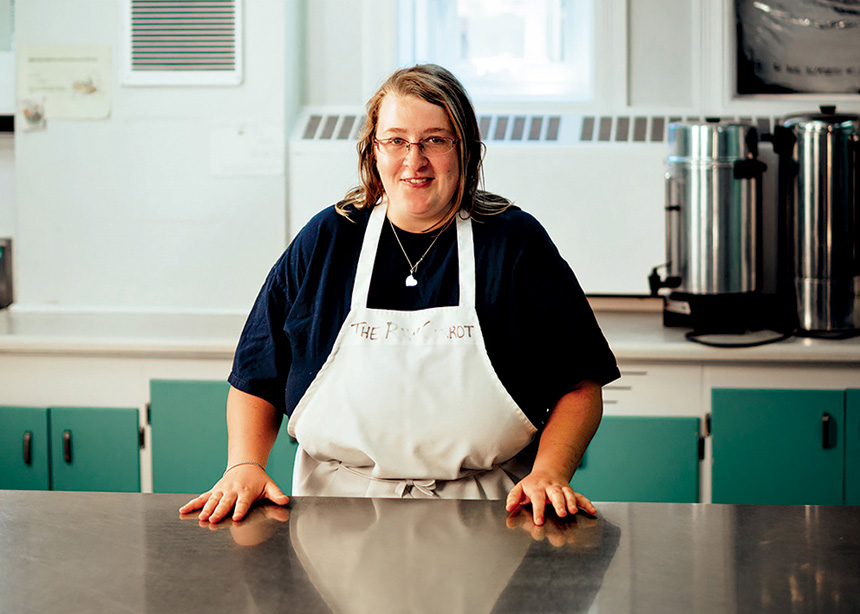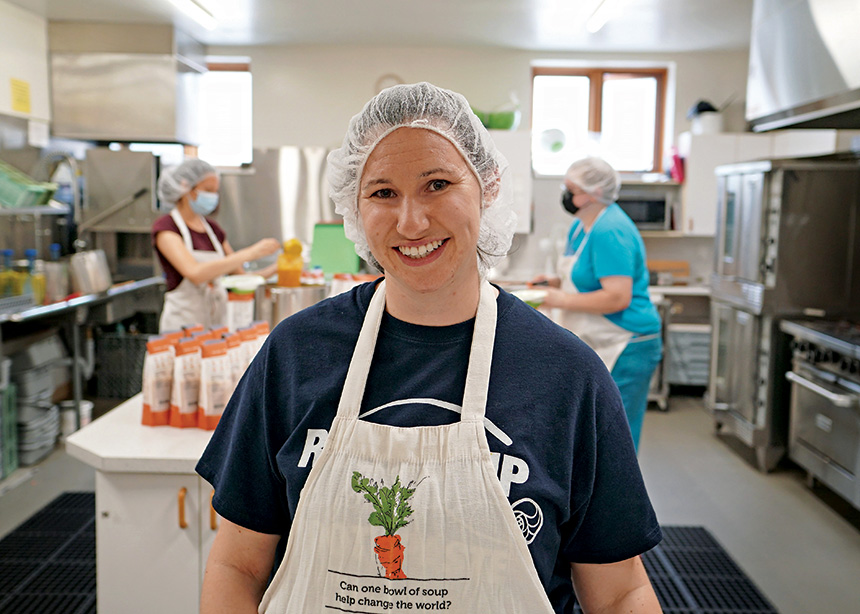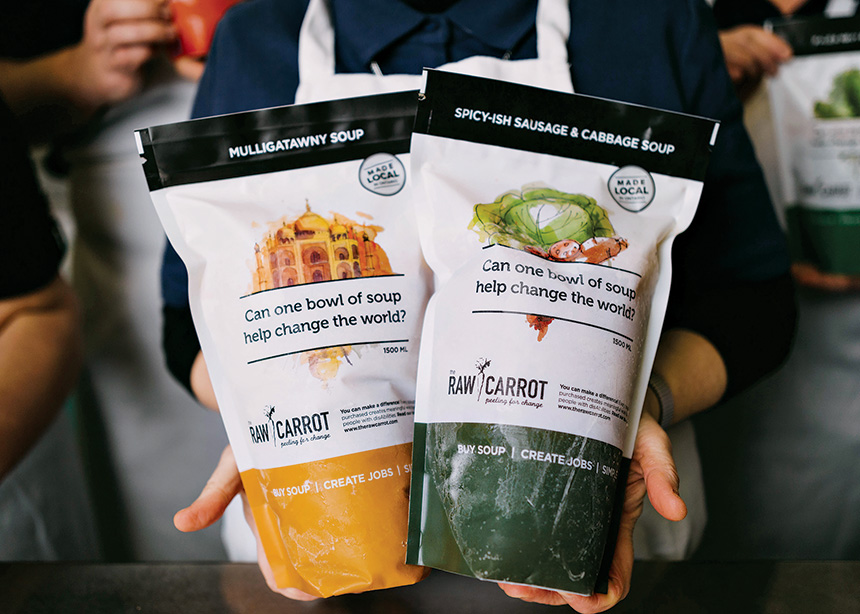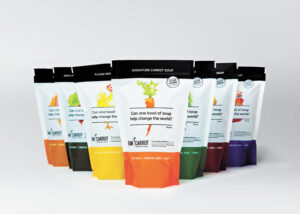A simple job creation project that started with two women’s concern for a young church member is now seeking new church partners to expand beyond its four current locations.
It started with Amanda, a 13-year-old who loved to play with kids and volunteer in the church nursery. She was loyal, punctual and reliable. She also had a mild intellectual disability and couldn’t read past a grade 3 level. It seemed she was headed straight into the social services system, like her parents.
When Amanda was completing high school, Rebecca Sherbino, a concerned adult mentor at Paris Presbyterian Church in Paris, Ontario, looked into an employment training agency that offered job readiness skills. Rebecca drove Amanda to the program twice a week for six months. At the end of the program, Amanda had three interviews but no job.
Amanda was one of a number of people at her church who were marginalized because of poverty, mental health challenges or disabilities. Some accessed the church crisis intervention fund to make ends meet. While these people had the potential to work and a desire to so, they faced multiple employment barriers in the traditional workplace.
Motivated by the need they saw and by the love of Jesus, Sherbino and Colleen Graham, another member of Paris Presbyterian, talked often about how they could realistically fill the employment gap left by government programs. They felt called to administer justice, not just provide hand-outs and then pat themselves on the back. They were frustrated with band-aid solutions to poverty and marginalization.
Sherbino has a master’s degree in international development and had spent five years working with marginalized communities in Sudan and Malawi. Graham has a degree in nursing science and experience in health administration. She believes in combining science and business with care and compassion.
Based in a belief that God values people and wants to see them thrive in all aspects of life, the two women launched the Raw Carrot Soup Enterprise. They hired staff, including Amanda, to make handcrafted gourmet soup in their church’s commercial kitchen. They sold frozen, handcrafted soup pouches in local stores, markets and online.
Raw Carrot is now in its ninth year, having expanded from Paris Presbyterian to three other production/ministry locations: Innerkip Presbyterian, Mount Forest United Church and Mennonite Central Committee Ontario/Stirling Avenue Mennonite Church in Kitchener. The organization provides permanent, dignified, part-time employment to 32 people living with disabilities and mental illness. Drawing on a loyal customer base, sales reached $200,000 last year.
MCC
Since 2017, Mennonite Central Committee (MCC) Ontario has operated a Raw Carrot location in partnership with Stirling Avenue Mennonite Church in Kitchener. The location produces 400 to 500 bags of soup per month.
Jennifer Klassen, who was the first kitchen manager in that location, talks about the challenges faced by some of their staff. “In their lives, some have been mocked because of their disabilities or made to feel they aren’t good enough, or have nothing to offer.”
The global pandemic compounded the challenges for many people with disabilities. Fear of illness, loss of income and social isolation amplified their barriers. But for The Raw Carrot staff, the pandemic brought a renewed sense of significance and belonging. “Because of the pandemic, they were told that they are essential workers so were able to work. Can you imagine what that message can do for someone?” says Klassen.
As part of a recent staff evaluation process, staff shared what their work experience has meant to them. One person said: “It’s a safe space and place for you to make friends. It helps me stay focused on my job and my daily routines. I just love being here.”
Another said: “The work environment at The Raw Carrot is inclusive and welcoming . . . . I have been able to learn and develop my community-based skills.”
As for current kitchen manager Leah Cober, she says, “It’s incredibly meaningful and rewarding work!”
Justice leadership
By taking the initiative to show compassion and promote inclusion, the church can play a vital role in creating a more equitable and just society. Aside from providing accessible parking, ramps and washrooms, churches can provide dignified employment.
Sherbino has a vision for people in all communities in Canada to be meaningfully employed and able to meet their basic needs. She questions whether we can continue to afford not to care if our current interventions are actually “working.” She challenges churches to take action.
“Do you feel like the depth of need in people’s lives is actually too great to meet with a food card or community meal? Has crisis intervention turned into ongoing support instead of just surviving a crisis?” she asks. “If so, I want to ask you: Is Christ calling you to a deeper ministry? One that actually meets people’s needs for the future?”
One option is to join the churches embracing the Raw Carrot model. While the pandemic did slow growth, a new Raw Carrot site is expected to open in Guelph this year, and more are in the works.
Sherbino invites others to consider joining. “We’d welcome anyone to reach out to us for further conversation,” she says. “Churches are able to start a site on their own, but there could be opportunities for growth together with MCC Ontario, and we would welcome those conversations.”
About 75-80 percent of the costs of each site are covered through product sales, with the remaining 20-25 percent from grants, donations or a subsidy from a partner church or organization. Sherbino says often the church helps to pay a portion of the expenses, which are about $10,000 annually. This investment creates employment for 8 to 12 people in permanent, part-time work. Staff earn 15-25 percent over social assistance rates.
A partner church requires:
- a desire to provide a sustainable hand up for people in need;
- a commitment to justice for the poor and those on the margins;
- a kitchen that is public health certified and available two to three days per week;
- a willingness to fundraise to get the site off the ground and then continued commitment to yearly costs; and
- a champion as well as leadership that is on board to bring the ministry to life.
Back in the kitchen at Paris Presbyterian, Amanda is in her ninth year working at The Raw Carrot. She likes the job. “It’s pretty happy in The Raw Carrot kitchen,” she says. Being able to work has changed her life by giving her money to help with bills, food, pets, groceries and buying things for her mom.
Diane Talbot-Schoenhoff serves as director of communications and outreach for The Raw Carrot. For more information, contact Rebecca Sherbino at rebecca@therawcarrot.com.











Leave a Reply
You must be logged in to post a comment.